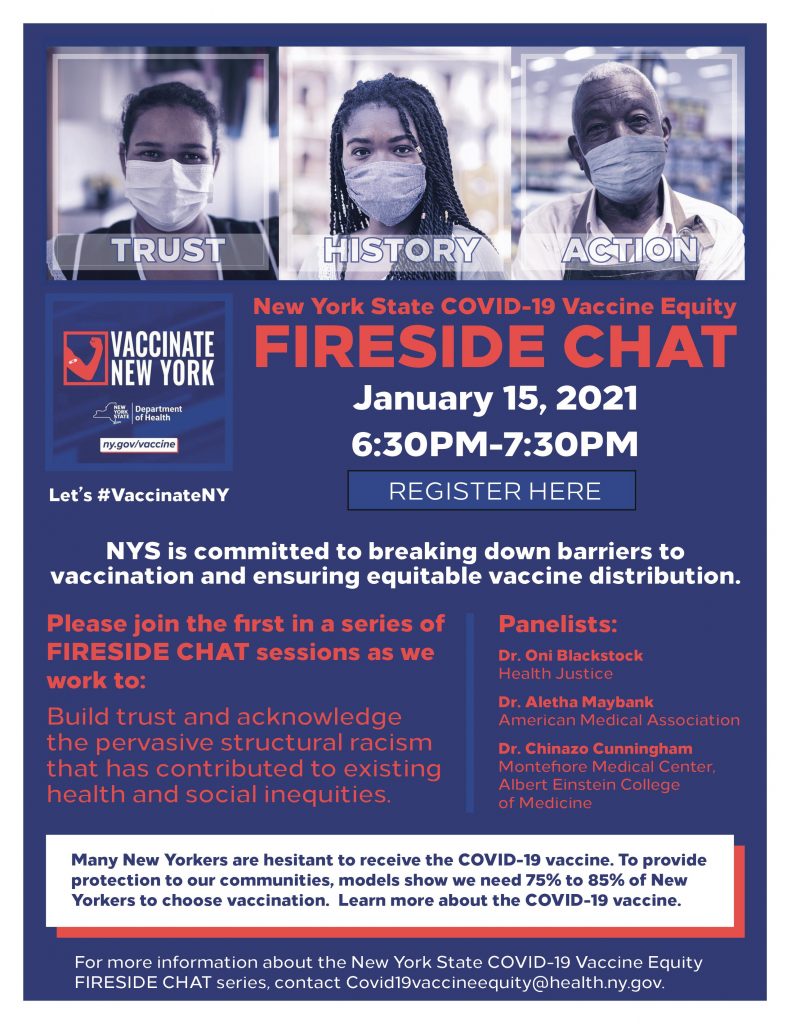
New York State COVID-19 Vaccine Equity Fireside Chat on January 15, 2021



Official blog of the Asian American Bar Association of New York

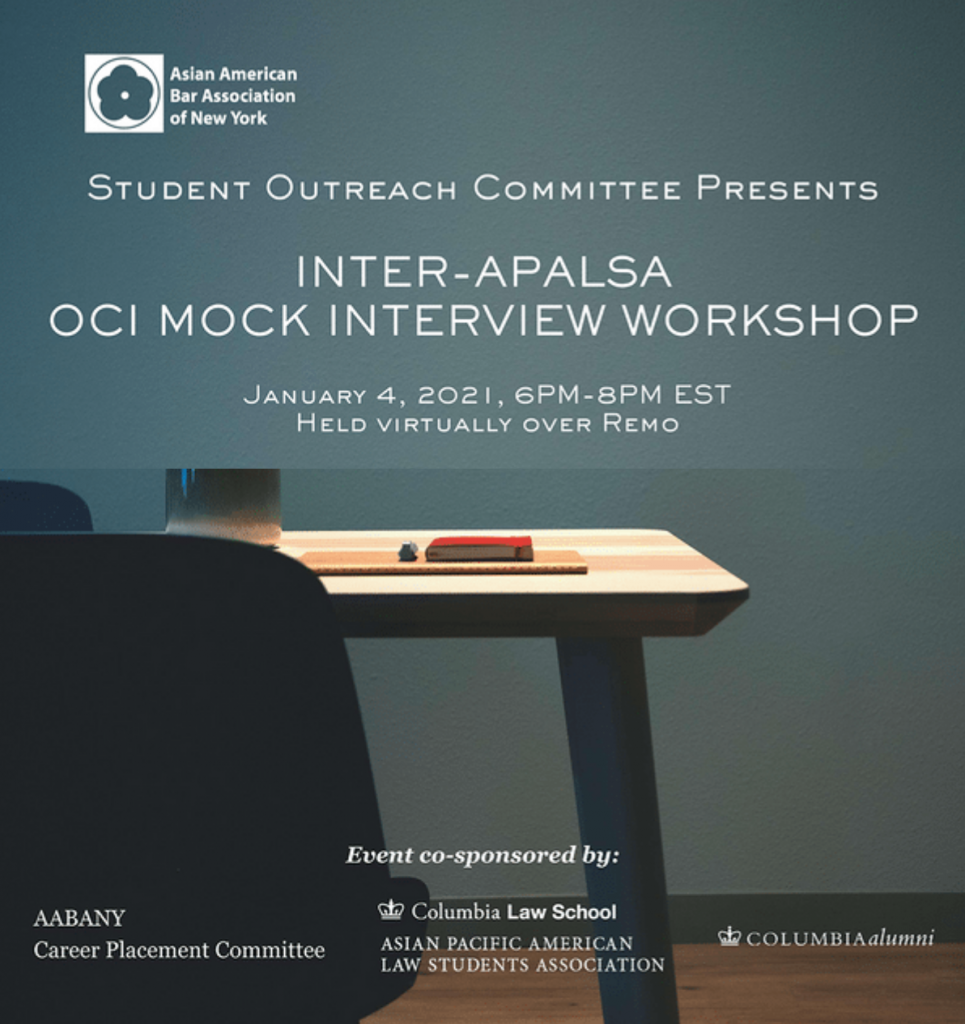
On Monday, January 4, 2021, AABANY’s Student Outreach Committee hosted its first virtual Mock Interview Workshop in collaboration with Columbia Law School APALSA, AABANY Career Placement Committee, and the Columbia Law School Alumni Association. The event was part of the Student Outreach Committee’s pre-OCI series, held to prepare students for the interviews during a time of great uncertainty. 90 students from various law schools in and outside of New York received mock interviews and OCI advice from over 40 practitioners, public servants and general counsels from diverse backgrounds.
Prior to the workshop, Columbia Law School APALSA initiated the pairing of students and attorneys according to their availability and shared practice interests. Once the student-attorney pairings were solidified, students connected with attorneys via email. This advance preparation made for a smooth and timely transition to the event.
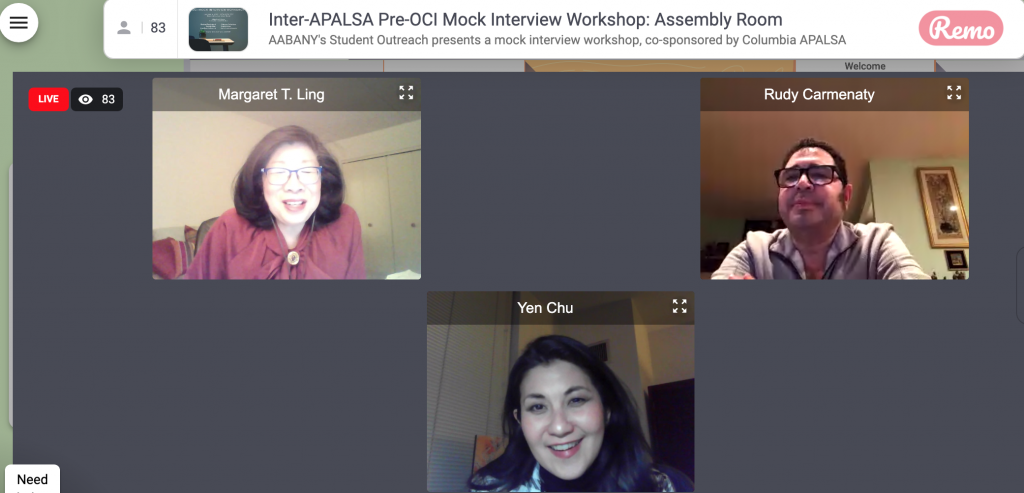
The workshop began promptly at 6:00 PM with a panel discussing interview tips, dos and don’ts, and Zoom etiquette. The panel, moderated by Margaret Ling, AABANY’s Development Director, featured esteemed speakers Rudy Carmenaty, President of the Columbia Law School Alumni Association, and Yen Chu, Secretary of the Columbia Law School Alumni Association. An OCI tip sheet carefully prepared by the members of the Student Outreach Committee was circulated to the students for review prior to their mock interviews. Starting at 6:30 PM, students met with their paired attorneys for one-on-one 30-minute mock interview sessions through the Remo platform and received invaluable feedback. Many students and attorneys expressed how beneficial the event was and that they appreciated AABANY for organizing such an event where attorneys could pay it forward and students could gain unique interview experiences from well-regarded practicing attorneys and public servants. One student, Eleen Zhou, a 2L from Cornell Law School, commented that she found the mock interview extremely helpful in preparation for the OCI season. Despite a few technical difficulties, members of the Student Outreach Committee worked diligently and promptly to ensure that no attorney or student was left without a mock interview opportunity.
The Student Outreach Committee would like to thank the participating attorneys for generously contributing their valuable time to help our students practice their interview skills. For students entering the interviewing season, best of luck! Please do not hesitate to reach out if AABANY’s Student Outreach Committee can ever be a resource for you. For more information about the Committee go to https://www.aabany.org/page/121
The Asian American Bar Association of New York (AABANY) was recently mentioned in a Law360 article on New York state bar associations’ reactions to the violence that occurred at the U.S. Capitol on Wednesday, January 6, 2021. The article states: “The Asian American Bar Association of New York, one of the state’s most vocal attorneys group, endorsed a
statement published by its parent organization, the National Asian Pacific American Bar Association, decrying the storming of the Capitol as the act of militants.”
NY Lawyers Condemn Storming Of US Capitol By Mob
By Marco Poggio
Law360 (January 7, 2021, 4:34 PM EST) — Prominent New York state bar associations have condemned the violence that unfolded in Washington, D.C., on Wednesday, in which a mob of President Donald Trump’s supporters broke into the U.S. Capitol as the Electoral College vote certification was in progress, resulting in the deaths of four people. Read more here (subscription is required).
For Immediate Release: Date: January 8, 2021
Contact: Priya Purandare, Executive Director
Biden Administration Lacks AAPI Cabinet Secretary for The First Time in 20 Years
WASHINGTON—The National Asian Pacific American Bar Association (NAPABA) calls upon President-elect Joe Biden to remain committed to his promise to assemble a diverse Cabinet and administration that truly reflects America as he continues to appoint senior leadership candidates. For the first time in 20 years, there will not be an Asian American and Pacific Islander (AAPI) Cabinet Secretary despite the community having put forth one of the most extensive and impressive pool of candidates ever.
“NAPABA stands dismayed that AAPIs will not be represented at the Secretary level position in the inaugural Biden Cabinet,” said A. B. Cruz III, president of NAPABA. “While there have been many historic positive firsts for the incoming Administration, the AAPI community cannot help but feel dismissed. Countless individuals, including numerous members of Congress, community leaders across a broad spectrum, and many leading organizations, including many non-AAPIs, are calling for greater AAPI representation across leadership roles in the ongoing transition appointment process. We trust the new Administration will specifically address this apparent disconnect by nominating and placing AAPIs into key leadership roles going forward.”
###
The National Asian Pacific American Bar Association (NAPABA) represents the interests of approximately 50,000 legal professionals and nearly 90 national, state, and local Asian Pacific American bar associations. NAPABA is a leader in addressing civil rights issues confronting Asian Pacific American communities. Through its national network, NAPABA provides a strong voice for increased diversity in government and the judiciary on the local, state, and federal levels, advocates for equal opportunity in the workplace, works to eliminate hate crimes and anti-immigrant sentiment, and promotes the professional development of people of color in the legal profession.
For Immediate Release: Date: January 7, 2021
Contact: Priya Purandare, Executive Director
Vanita Gupta to become highest ranking AAPI in agency history
WASHINGTON – The National Asian Pacific American Bar Association (NAPABA) congratulates Judge Merrick Garland, Lisa Monaco, Vanita Gupta and Kristen Clarke on their nominations to serve in the Department of Justice in the Biden-Harris administration.
“NAPABA heartily congratulates these four stellar individuals on their nominations to lead the Department of Justice. These nominees have a long history of public service, including at the Department of Justice,” said A. B. Cruz III, president of NAPABA. “Notably, if confirmed, Vanita Gupta would become the highest ranking Asian American and Pacific Islander (AAPI) to ever serve at DOJ and the first woman of color to serve as Associate Attorney General. We are both proud of and encouraged by the nomination of Vanita and strongly recommend the Biden-Harris administration to continue to draw upon the demonstrated value of AAPI attorneys by actively engaging them to serve in other key leadership roles.”
We thank President-elect Biden for nominating Ms. Gupta to the position and fervently urge him to nominate an AAPI for a Cabinet Secretary position.
###
The National Asian Pacific American Bar Association (NAPABA) represents the interests of approximately 50,000 legal professionals and nearly 90 national, state, and local Asian Pacific American bar associations. NAPABA is a leader in addressing civil rights issues confronting Asian Pacific American communities. Through its national network, NAPABA provides a strong voice for increased diversity in government and the judiciary on the local, state, and federal levels, advocates for equal opportunity in the workplace, works to eliminate hate crimes and anti-immigrant sentiment, and promotes the professional development of people of color in the legal profession.
For Immediate Release: Date: January 6, 2021
Contact: Priya Purandare, Executive Director
WASHINGTON – The National Asian Pacific American Bar Association (NAPABA) strenuously condemns the violent actions and defiant breach of both security and safety at the U.S. Capitol by militants. Critical cornerstones of our Constitutional democracy are the peaceful transition of power within our government and the right of citizens to peacefully protest. Neither violence nor the threat of violence is at all acceptable and has no rightful place here. We call on the Administration, all elected officials, public servants, and all Americans to denounce the violence we witnessed today, support efforts needed to quiet the unrest, demand it cease immediately, and cause an immediate return to our foundational principles of a peaceful democracy and the rule of law.
###
The National Asian Pacific American Bar Association (NAPABA) represents the interests of approximately 50,000 legal professionals and nearly 90 national, state, and local Asian Pacific American bar associations. NAPABA is a leader in addressing civil rights issues confronting Asian Pacific American communities. Through its national network, NAPABA provides a strong voice for increased diversity of the federal and state judiciaries, advocates for equal opportunity in the workplace, works to eliminate hate crimes and anti-immigrant sentiment, and promotes the professional development of people of color in the legal profession.
ABA Presidential Appointments | NAPABA Endorsement Deadline is January 22, 2021 8:00 PM ET
Each year, the American Bar Association places a call for nominations for their Presidential Appointments. The NAPABA Selection Committee is seeking recommendations for the American Bar Association’s Presidential Appointments for the 2021-22 Bar Year.
For many years, NAPABA members and leaders have represented both our organization and the AAPI community within the American Bar Association.
NAPABA provides its members with exclusive opportunities to help them raise their professional profile. You MUST be an active NAPABA member to receive our endorsement for an ABA Presidential appointment.
Do you have great ideas? Issues that propel you? To secure NAPABA’s support for an endorsement, please fill out the form on our website by 8 PM ET on January 22, 2021.
Questions? Email Robin Glenn
For Immediate Release: December 30, 2020
Contact: Priya Purandare, Executive Director
WASHINGTON — The National Asian Pacific American Bar Association (NAPABA) congratulates Josh Hsu on his appointment as Counsel to the Vice President. Hsu is the first Asian American Pacific Islander (AAPI) to serve in the lead legal role for the Vice President of the United States.
“Josh Hsu has been a rising star and major contributor within the NAPABA community for many years. In 2015, he was recognized as one of NAPABA’s Best Lawyers Under 40. We are delighted that the Biden-Harris administration has appointed him to a senior leadership position as Counsel to the Vice President,” said A.B. Cruz III, president of NAPABA. “Vice President-elect Harris had one of the most diverse staffs in the Senate and her recent executive office appointments demonstrate her continued commitment to creating a government that better reflects the American citizenry. We celebrate Josh in his new role and trust that the Biden-Harris administration will continue to recognize the value of AAPI attorneys by rightfully placing them in leadership roles.”
Prior to his appointment, Hsu served as National Policy Director for Vice President-elect Harris’ presidential campaign and was formerly Deputy Chief of Staff and General Counsel for her Senate office. He has served as Chief Counsel for Nominations in the U.S. Senate Judiciary Committee under Ranking Member Patrick Leahy and as an attorney in the national legal department at the American Civil Liberties Union. Hsu clerked for the Honorable Denny Chin on the U.S. District Court for the Southern District of New York and graduated from Georgetown University Law Center and Georgetown University.
NAPABA advocated for a senior level appointment for Josh Hsu. We thank President-elect Biden and Vice President-elect Harris for appointing him to the position.
###
The National Asian Pacific American Bar Association (NAPABA) represents the interests of approximately 50,000 legal professionals and nearly 90 national, state, and local Asian Pacific American bar associations. NAPABA is a leader in addressing civil rights issues confronting Asian Pacific American communities. Through its national network, NAPABA provides a strong voice for increased diversity in government and the judiciary on the local, state, and federal levels, advocates for equal opportunity in the workplace, works to eliminate hate crimes and anti-immigrant sentiment, and promotes the professional development of people of color in the legal profession.
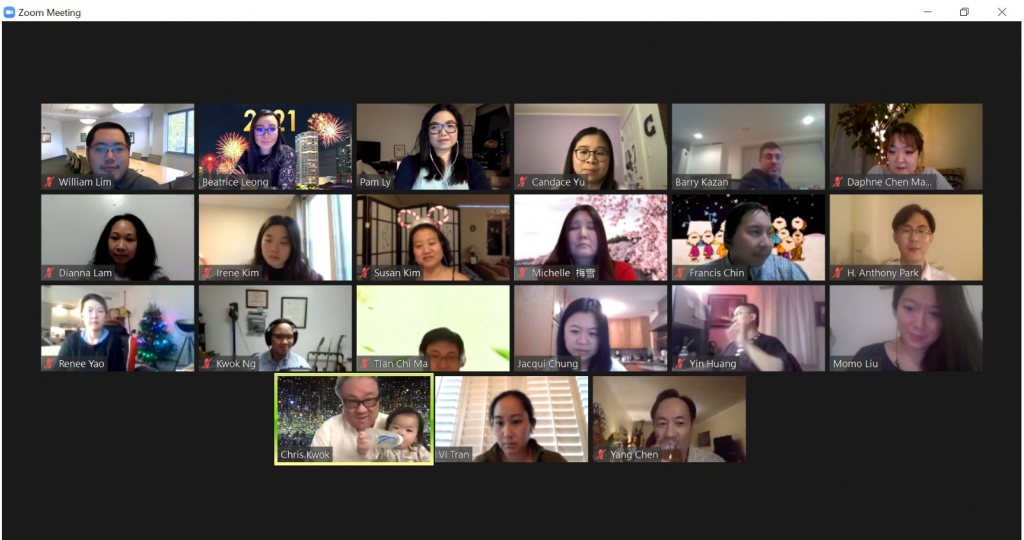
On December 18, 2020, the Membership Committee hosted their weekly virtual Membership Mixer, with 22 participants in attendance. This week, AABANY celebrated the end of 2020 on Zoom.
Participants were asked: “What was the best thing that happened to you in 2020 and what is your 2021 Resolution?” Participants reported that the best thing that happened to them in 2020 were cutting their commutes to have more time to themselves, spending time with family, exercising more, and learning to cook. As for New Year’s Resolutions, members said their goals were to be more active, take the COVID-19 vaccine, and find new jobs.
At the end of the mixer, Barry Kazan, a Partner at Mintz & Gold LLP, was awarded 2020 “MVP” (Most Valuable Participant) of AABANY’s Online Membership Mixers, for his great accomplishment of attending 23 out of 27 online mixers! In addition, Barry actively engaged in every mixer, including during our joint mixer with the Filipino American Lawyers Association of New York (FALA-New York), offering to pick up the membership fees for members of FALA-New York who were not already members of AABANY and vice versa. Thank you, Barry!

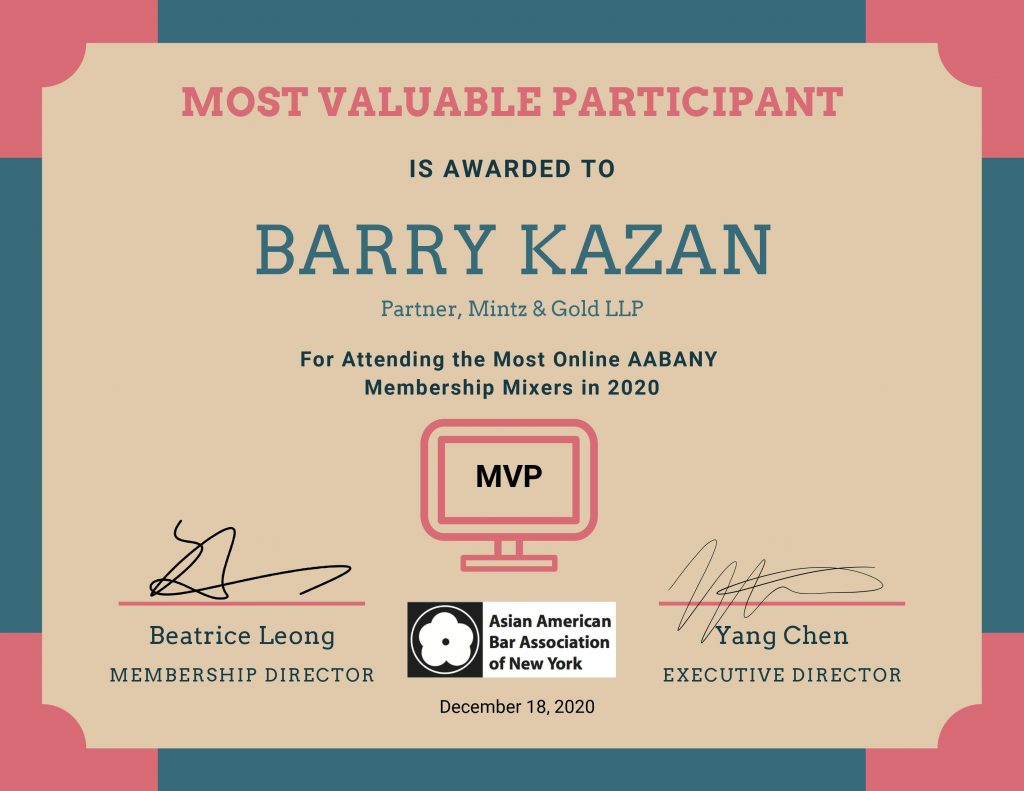
Candace Yu, AABANY Intern, won our Mixer prize this week. She had a choice between a six month online gym membership, or $50 in cash. Candace chose the cash.
The Membership Committee previously hosted Monthly Mixers at bars, ballparks, stadiums, operas, etc, but due to COVID, we have moved online to offer members a weekly outlet to share their feelings, see old friends, and make new connections. Mixers start at 6:30pm on Friday and the main event ends at 7:30pm but many often stay on after 7:30pm for smaller breakout groups.
Membership Committee will continue to host weekly virtual mixers until it is safe to gather together again in person.
We are giving away door prizes in some weeks. In order to win, you must be a member and must RSVP on the aabany.org website to get a raffle number. Non-members can join the mixer but won’t be eligible to win a prize.

On Thursday, December 10th, AABANY held its annual Holiday Party on Remo. The Remo event room was decorated with a holiday theme, including holiday character-themed table names and a crackling fireplace in the background. More than 30 AABANY members signed on to Remo to celebrate the holiday season.
To kick off the celebration, President Sapna Palla thanked everyone for coming and wished everyone happy holidays. She also took the opportunity to encourage everyone to join AABANY’s Virtual Gala being held on February 24, 2021 to recognize our Virtual Gala award honorees, Frank H. Wu, President of Queens College, City University of New York, and Sneha Desai, Deputy General Counsel of BASF.
Throughout the night, guests were able to move from table to table and talk with different people. Many guests enjoyed the optional Holiday Wine & Cheese Gift Basket or Hot Chocolate & Treats Gift Basket they ordered through AABANY.
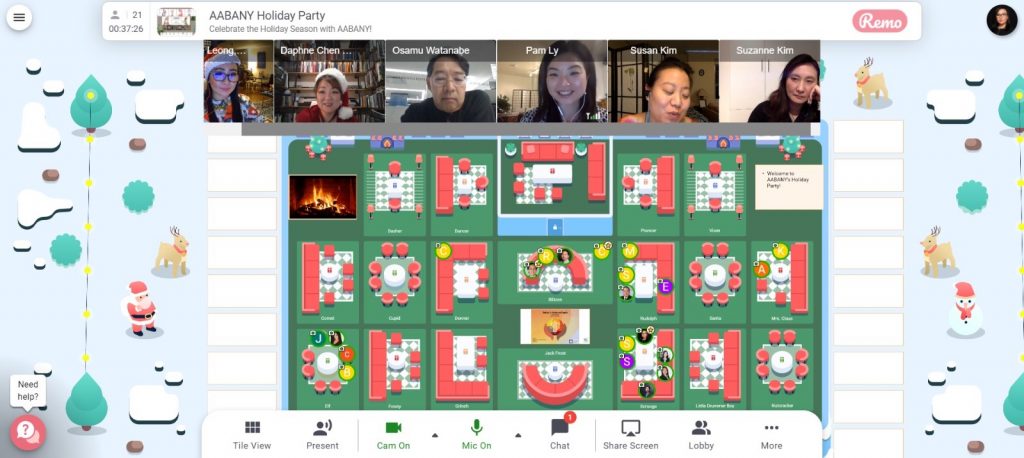
Thanks to everyone who took the time to join us virtually to celebrate the season. AABANY wishes everyone happy holidays!